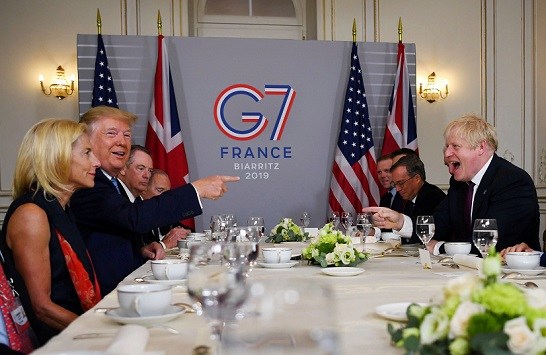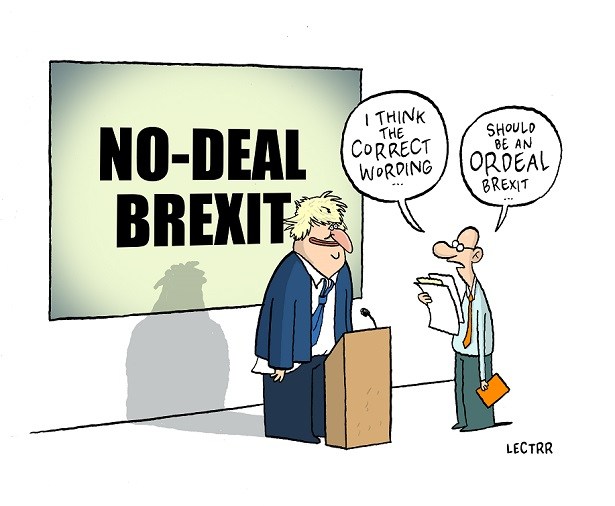Thursday 31 October is set to be a big day for the European Union. It is the last day of Jean-Claude Juncker’s tenure as president of the European Commission. And Halloween is also the day when Britain is finally due to leave the EU.
As it stands, the UK seems likely to crash out of the EU in the most ghoulish way. That is without an exit deal – and with Prime Minister Boris Johnson seemingly intent on compensating for the disruption to trade with the EU by cutting taxes, slashing regulations, letting the pound plunge and cosying up to US President Donald Trump. Such an antagonistic no-deal Brexit could create lasting bitterness and even enmity, with negative repercussions for everything from defence cooperation to people flows.
So Juncker’s successor, Ursula von der Leyen, may face a baptism of fire on her first day in office on 1 November – All Saints Day. She will be praying that the saints look kindly on her.
While von der Leyen and Johnson seem as different as chalk and cheese, they have more in common than meets the eye. Both lived in Brussels as a child. Both attended the city’s European School (although they were not contemporaries). And their fathers both worked for the European Commission for a time. But while von der Leyen has long been one of the most pro-EU German politicians of her generation, Johnson has become a leading Brexiteer, so she can expect few favours from him.
Johnson’s second stay in Brussels sowed the seeds for the current Brexit mess. When he returned to the city from 1989 to 1994 as a young journalist for the Daily Telegraph, then the UK’s best-selling conservative newspaper, his colourful and comic writing played a key role in fostering and popularising anti-EU sentiment in Britain.
The exciting 90s
With Jacques Delors at the helm of the Commission, it was an exciting era for European integration. The Berlin Wall had just fallen. Barriers were falling left, right and centre. The future seemed to belong to a united Europe. The Single Market was launched in January 1993, in preparation for which the Commission had been busy harmonising myriad national regulations. The EU itself was born that November, replacing the earlier European Communities. And the Maastricht Treaty also paved the way for the launch of the euro in 1999.
The early Nineties were a time of optimism and openness. Yet Johnson painted a very different picture of the European project. He vividly portrayed the EU as both dangerously determined to grab powers from nation states and absurd in its desire to micromanage every detail of people’s lives. By his account, the Commission was busily banning bent bananas, constraining the size of condoms and prohibiting that staple of British cuisine, prawn cocktail crisps. Never mind that this was mostly fake news. It was fun to read – and by bringing to life the dry and technical subject of the encroachment of EU regulations on national sovereignty, it fostered popular fears of a “European superstate” in the making.
Johnson also deployed his gift for shameless populism to devastating effect in the Brexit referendum campaign in 2016. He opportunistically decided to back the Leave campaign at the last minute; infamously, he wrote two comment pieces for the Telegraph, one backing Remain and the other Leave, finally opting to send the latter because it best served his ambition of becoming prime minister. His charm, charisma and confidence tricks then helped swing the vote for Brexit. Whereas most Leave-supporting Conservative politicians were widely seen as bores, cranks and obsessives – and Nigel Farage’s far-right views repelled as many voters as they attracted – Johnson gave the Leave campaign a popular, credible and moderate-seeming façade.
Undeniably, Johnson’s unprincipled opportunism has served him well. Against the odds, a politician widely dismissed as a lazy, scandal-prone buffoon has become prime minister. And now that he seems determined to drive the country at full speed towards a no-deal Brexit cliff on 31 October, it would be a mistake to underestimate him.
Until recently, people in Brussels didn’t take seriously the threat of a no-deal Brexit. They assumed that while British politicians might talk tough, they would eventually back down – just as Greece’s radical-left prime minister, Alexis Tsipras, did in the summer of 2015 when confronted with the potentially catastrophic consequences of crashing out of the euro.
A no-deal Brexit would be painful for the EU, especially for Ireland. Indeed, it could tip the fragile eurozone economy into recession. With Germany already suffering from China’s slowdown and the uncertainty created by Trump’s trade wars, disruption to another major export market is the last thing its hard-pressed manufacturers need.
But a no-deal Brexit could be truly catastrophic for Britain. The UK government’s own no-deal Brexit planning envisages long queues at the main port of Dover and a slump in trade with the EU as new tariff and regulatory barriers go up overnight. It foresees shortages of food, medicine and fuel. And it warns of civil unrest. Indeed, a no-deal Brexit arguably poses an existential threat to the UK, since it makes both Scottish independence and Irish reunification more likely.
Surely, then, in a game of chicken, the UK Mini will ultimately swerve to avoid a no-deal Brexit car-crash, rather than collide with the full force of the EU juggernaut?
Not necessarily. An astonishing recent opinion poll found that most members of the ruling Conservative Party were willing to incur significant damage to the economy, the break-up of the UK and even the destruction of the party itself to achieve Brexit. The victory of Nigel Farage’s new Brexit Party in the European elections in May has also convinced Johnson that he must deliver Brexit at any cost in order to have a chance of winning the next general election, which is not due until 2022 but is likely to come much sooner.
So while a no-deal Brexit would be terrible for Britain, the pursuit of it would appear to make political sense for Johnson, at least in the immediate term. But while radicalised Leave supporters either believe the likely disruption of a no-deal Brexit is exaggerated, think the pain will fall on others, or claim to be willing to bear the costs, the reality of No Deal is unlikely to prove popular with most voters. And since Johnson’s top priority is his survival as prime minister, he may secretly hope (or calculate) that he will be prevented from going through with his no-deal threat.
The risks of no-deal
Johnson may reckon that the imminent threat of No Deal may lead Ireland – and thus the EU – to drop the controversial “backstop” in the UK’s withdrawal agreement and thus agree a revised exit deal at the last minute. To preclude the need for border controls between Northern Ireland and Ireland come what may, the backstop stipulates that the UK must keep its import tariffs, regulations, value-added-tax system and other necessary measures aligned with those of the EU unless and until alternative arrangements avoid the need for this. Yet perversely, a no-deal Brexit would inevitably lead to such border checks – the very thing the backstop is meant to avoid – not least to safeguard the Single Market.
Even so, there is little chance that the EU will agree to Johnson’s demand to drop the backstop. The Irish government would hate to see the imposition of border controls that would threaten the fragile peace in Northern Ireland, but since the regulatory and trade divergence that Johnson seeks would require them in any case, it would prefer to be able to blame them on his intransigence than to acquiesce to them. As for the EU as a whole, abandoning Ireland in its hour of need would undermine its support for other small countries, while giving in to British blackmail would undermine its credibility in future negotiations.
While the EU is unlikely to budge, Johnson may also believe that the UK parliament will ultimately stop him from crashing out of the EU. But while a clear majority of parliamentarians oppose a no-deal Brexit, they are deeply divided on their aims, priorities and tactics. Some just want to stop a no-deal Brexit, others to stop Brexit altogether. While some want to bring down the government, others would rather not.
One option would be for parliament to wrest control of the government’s legislative prerogative and pass a law ordering the government to seek an extension of the 31 October Brexit deadline, but this is a tall order. Another option would be a no-confidence vote that brought down the government; Johnson has a parliamentary majority of one. But an alternative government that spanned the far-left to anti-Brexit Conservatives is implausible and the resulting general election might not happen until after Britain had left the EU.
Even if parliamentarians do manage to force a general election before Britain exits the EU, Johnson would stand a good chance of winning it. He is already in campaign mode, promising extra spending on healthcare, the police and much else. And if parliament blocked a no-deal Brexit, he could readily run a populist campaign pitting “the people against parliament” that could unite most Leave voters behind him. In contrast, Remainers are split. While the Liberal Democrats, Greens and Welsh Nationalists are planning an electoral alliance, there is little prospect of this stretching to the Labour Party under its hard-left (and closet Brexiteer) leader, Jeremy Corbyn.
A no-deal Brexit is not inevitable. But it is worryingly likely. So Ursula von der Leyen and other EU leaders need to start thinking hard about its broader consequences. The economic disruption to the EU may be containable. With luck, the political disruption to peace in Northern Ireland is too. But the geopolitical consequences are potentially alarming.
At a time when Trump, Russia’s Vladimir Putin and China’s Xi Jinping all seek to divide and rule in Europe, having a hostile UK government on the EU’s doorstep would be deeply damaging. Brexit Britain would be a lonely, humiliated pawn in bigger countries’ power plays. But the EU would be weakened and vulnerable too.
By Philippe Legrain


